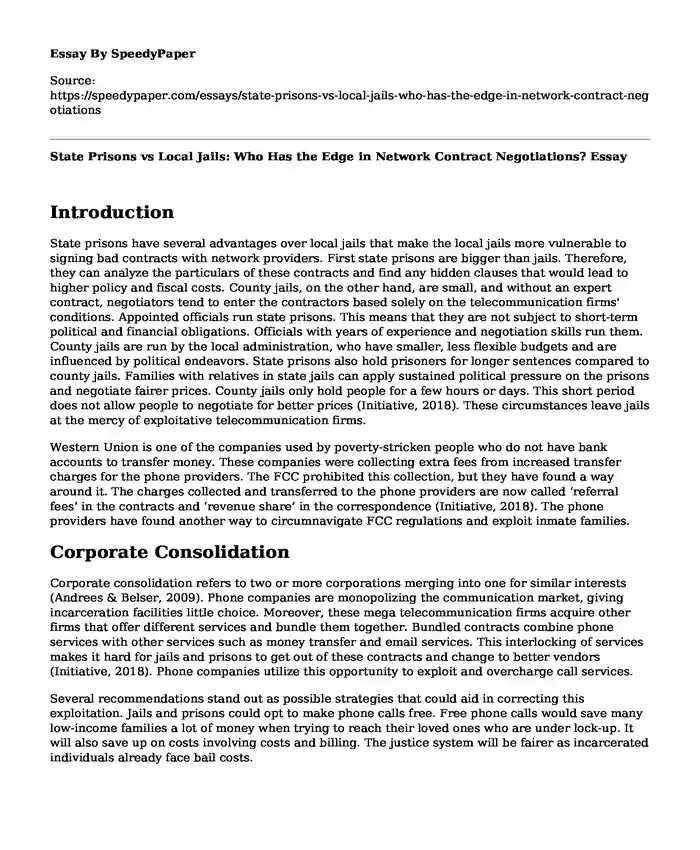
| Type of paper: | Essay |
| Categories: | Law Criminal law |
| Pages: | 3 |
| Wordcount: | 619 words |
Introduction
State prisons have several advantages over local jails that make the local jails more vulnerable to signing bad contracts with network providers. First state prisons are bigger than jails. Therefore, they can analyze the particulars of these contracts and find any hidden clauses that would lead to higher policy and fiscal costs. County jails, on the other hand, are small, and without an expert contract, negotiators tend to enter the contractors based solely on the telecommunication firms' conditions. Appointed officials run state prisons. This means that they are not subject to short-term political and financial obligations. Officials with years of experience and negotiation skills run them. County jails are run by the local administration, who have smaller, less flexible budgets and are influenced by political endeavors. State prisons also hold prisoners for longer sentences compared to county jails. Families with relatives in state jails can apply sustained political pressure on the prisons and negotiate fairer prices. County jails only hold people for a few hours or days. This short period does not allow people to negotiate for better prices (Initiative, 2018). These circumstances leave jails at the mercy of exploitative telecommunication firms.
Western Union is one of the companies used by poverty-stricken people who do not have bank accounts to transfer money. These companies were collecting extra fees from increased transfer charges for the phone providers. The FCC prohibited this collection, but they have found a way around it. The charges collected and transferred to the phone providers are now called ‘referral fees’ in the contracts and ‘revenue share’ in the correspondence (Initiative, 2018). The phone providers have found another way to circumnavigate FCC regulations and exploit inmate families.
Corporate Consolidation
Corporate consolidation refers to two or more corporations merging into one for similar interests (Andrees & Belser, 2009). Phone companies are monopolizing the communication market, giving incarceration facilities little choice. Moreover, these mega telecommunication firms acquire other firms that offer different services and bundle them together. Bundled contracts combine phone services with other services such as money transfer and email services. This interlocking of services makes it hard for jails and prisons to get out of these contracts and change to better vendors (Initiative, 2018). Phone companies utilize this opportunity to exploit and overcharge call services.
Several recommendations stand out as possible strategies that could aid in correcting this exploitation. Jails and prisons could opt to make phone calls free. Free phone calls would save many low-income families a lot of money when trying to reach their loved ones who are under lock-up. It will also save up on costs involving costs and billing. The justice system will be fairer as incarcerated individuals already face bail costs.
Service Providers
Another recommendation involves service providers. Service providers should provide an alternative, lower-cost methods of paying for their services. This should be concentrated on their low-income markets, those without bank accounts. Call service providers should also look to other money transfer providers such as PayNearMe, which offer their services at lower costs (Initiative, 2018). This would save the lower-income families from high bills when communicating with inmates.
The state legislature should contemplate building up a framework that sets a most extreme commission sum on an every minute basis for instance 1 penny per minute to give jails a financial motivator to both increment phone volume and keep the total expense to purchaser low now and later on (Initiative, 2018). These recommendations should allow more accessible communication between jail and prison inmates and their lawyers and relatives on the outside.
References
Andrees, B., & Belser, P. (2009). Forced labor: coercion and exploitation in the private economy. Lynne Rienner Publishers. https://www.rienner.com/browse_books/42/sort/author/asc
Initiative, P. P. (2018, December). State of Phone Justice. https://www.prisonpolicy.org/phones/state_of_phone_justice.html
Cite this page
State Prisons vs Local Jails: Who Has the Edge in Network Contract Negotiations?. (2023, Aug 26). Retrieved from https://speedypaper.com/essays/state-prisons-vs-local-jails-who-has-the-edge-in-network-contract-negotiations
Request Removal
If you are the original author of this essay and no longer wish to have it published on the SpeedyPaper website, please click below to request its removal:
- Free Essay about Social Action Plan
- Free Essay about History of Gun Control in America
- Free Essay Example on Governmentality and Crime
- Essay Sample on Rape Victimization
- Essay on GPS Monitoring Technology: A Revolutionary Tool in Criminal Justice
- Diaz v. Carcamo Legal Analysis. Essay Example
- Paper Example. Computer Crimes: Viewing the Future
Popular categories




